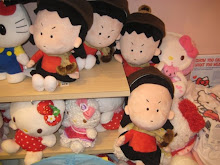Amerasia Journal: Call for Abstracts
"Global Community Formations and Asian American Futures"
Amerasia Journal, UCLA Asian American Studies Center, and the U.C. Berkeley Center for Globalization and Information Technology
Consulting Guest Editors: Michel Laguerre, Professor and Director, Berkeley Center for Globalization and Information Technology, and author of Global Neighborhoods: Jewish Quarters in Paris, London, and Berlin, 2008; and Dr. Joe Fong, Ph.D. from University of California at Berkeley, Research Associate at BCGIT, and author of Complementary Education and Culture: in the Global/Local Chinese Community, 2003.
Amerasia Journal Editor: Adjunct Prof. Russell C. Leong, English and Asian American Studies, project director www.uschinamediabrief.com
Review & Publication Deadlines:
Due date July 15, 2009: 2-page abstracts.
Due date of final papers: Feb. 1, 2010
Publication date of issue: Fall/Winter 2010
Send copies of abstracts to: Dr. Joe C. Fong Kuankung@hotmail.com; Dr. Michel Laguerre bcgit@berkeley.edu; Russell Leong rleong@ucla.edu Inquiries and abstracts will be reviewed by the editors, and the authors notified.
Amerasia Journal now invites contributions for an innovative forum on "Global Community Formations and Asian American Futures." (For past issues or reference, see 50,000 pages of 40 years of Amerasia Journal, the core journal in Asian American Studies, are also now online through your institutional or individual subscription: through MetaPress.)
In the U.S., researchers and the public at large may still perceive Asian American communities as "glittering ghettos" within localized urban or suburban areas. That perception is outdated and inaccurate: they are neither ghettos, nor are they merely affluent enclaves. Rather, scholars in this field are seeing the multiple and complex effects of globalization in many contemporary urban Asian American communities across the United States, which are no longer localized in the traditional sense. Scholars are re-discovering global elements with Asian communities that integrate with existing structures, or create new ones, whose characteristics may not be so easily defined in past terms.
Already, localized Asian American culture and ethnic entrepreneurship link and intersect with globalized community and transnational culture. Global businesses, music, film and literature from Asia, for example, have transformed traditional urban areas into "globalized/localized" cultural zones. Likewise, Asian American communities have also experienced other dimensions of globalization from food to religious practices, from interethnic workplace cooperation to open conflict around sweatshops, unionization, or workplace standards. Asian American communities, particularly in the suburbs, appear far more "global" than the average local community, though not "global" in the same sense that major cities around the world, such as Tokyo and New York, are considered global. This transformation has led to the need for updated theoretical and methodological approaches to understanding 21st century Asian American community formation.
"Global Community Formations and Asian American Futures" thus extends and complements recent 2000-2009 issues of Amerasia Journal on the creation of "Asian American Places," on 'North American Asians (Canada); and on "Asians within a Transcultural Context"(Latin America), and "Asian American Literature in China, Poland, Sweden, Italy, etc." : these special editions also involved scholars from Asia, Europe, and the Americas.
Thus, "Global Community Formations" also welcomes international scholars and U.S. scholars who do work on the dual transnational consequences of Asian Americans and globalization on their countries, e.g. remittances and labor transfer; trafficking and human rights issues, Asian American involvement in homeland politics in India, Cambodia, Vietnam, Philippines, and elsewhere.
This Amerasia issue solicits papers that address the global as well as local dimensions of Asian American community in the 21st century in in relation to community formation, social institutions and networks, media, politics, etc.. Factors which will continue to shape Asian American communities include the following: 1. the impact of Asia's economic and cultural influence through institutions and medium such as banks and media; 2. transnational science, technological, and professional migration both ways; 3. transnational legal and human rights issues; and, 4. the reciprocal social/cultural and economic infrastructure of Asian communities as reflected in settlement, educational, and work patterns, as well as political participation in the U.S. and abroad.
We hope to address the following questions and will review abstracts in the following areas (but not restricted to these topics):
(1) Due to the influence of Asia's globalization on Asian American communities, what changes have occurred? How have they affected the community's social structure, cultural institutions, and politics in America?
(2) Has such transformation (i.e. Asia's globalization) taken place in and impacted non-Asian neighborhoods and suburbs in the United States? Here, we include not only the usual metropole
centers such as L.A., New York, or Chicago, but medium-sized and smaller cities and towns.
(3) Have these changes enhanced or hindered Asians' accomplishments in the area of education, businesses, and others within the larger society? How have these changes led to the formation of working, middle, and upper class Asian American communities?
4.) What is the relationship of Asian Americans with other minority groups at the workplace, in school, and in other venues, e.g. Asians and Latinos, African Americans, and with other ethnic groups? Are these relationships contested--and what are the significant issues?
5. How do "hot button" issues around religion, homeland politics, same-sex marriage
and sexual diversity, and local and global Asian media play out in Asian American communities nationally? Are there regional and demographic differences?
We hope that the papers will enable us not only to contribute to the field of Urban Studies and Asian American Studies, but also to unrestrict the conversation of community forces, social capital, and ethnic enclave.
If you have other topics not included above, please direct your inquiries to the editors.
--
Don T. Nakanishi, Ph.D.
Director and Professor
UCLA Asian American Studies Center
3230 Campbell Hall
Los Angeles, CA 90095-1546
phone:310.825.2974
fax:310.206.9844
e-mail:dtn@ucla.edu
web site for Center: http://www.aasc.ucla.edu/default.asp
Subscribe to:
Post Comments (Atom)




No comments:
Post a Comment